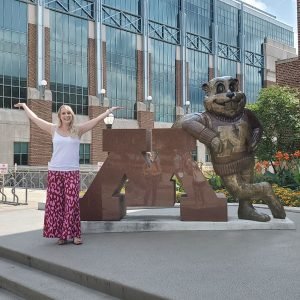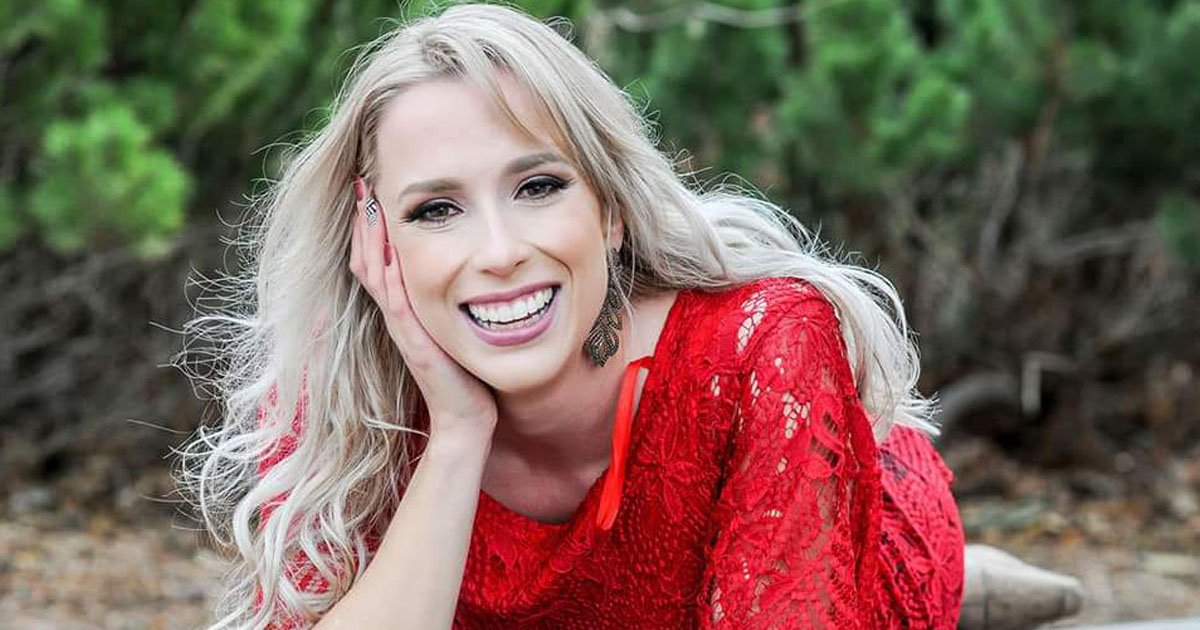"After working for a few years in various healthcare positions, I knew I didn’t need to work face to face with patients to be fulfilled in my work. I knew that I could still have a positive impact on my community working outside the clinical setting."
First, I’d like to know a little bit about you as a person. Where did you grow up? Where did you attend undergrad and what was your degree/area of study? [Christy] I grew up in Stillwater, MN. I’m a first-gen college student and the first out of the four of my siblings to go to college. After high school, I went to community college a few different times, but ultimately ended up dropping out. I ended up going back when I was 24, and at 27, I graduated from the University of Wisconsin-River Falls with a degree in psychology and communication studies.
How did you become interested in public health? [Christy] I hadn’t heard of public health until I had one of my professors in undergrad introduce me to the field while researching careers. My plan originally was to become a provider. After working for a few years in various healthcare positions, I knew I didn’t need to work face to face with patients to be fulfilled in my work. I knew that I could still have a positive impact on my community working outside the clinical setting. At the end of the day, I’m happy as long as I know that I’m doing something that helps someone.
 What do you think drew you to public health? [Christy] I grew up in a fairly rural community and so I’ve always been concerned for rural populations. Healthcare was never a priority and my family didn’t always get the healthcare that we needed. When my brother was around 25, he had developed some pain in his back. He didn’t seek medical care or treatment because he didn’t have insurance. Originally, he went about trying to ignore his symptoms until he couldn’t any longer. After going in to the doctor, he was diagnosed with stage 4 cancer. That was something that really impacted me and made me want to help people from ending up in a similar situation.
What do you think drew you to public health? [Christy] I grew up in a fairly rural community and so I’ve always been concerned for rural populations. Healthcare was never a priority and my family didn’t always get the healthcare that we needed. When my brother was around 25, he had developed some pain in his back. He didn’t seek medical care or treatment because he didn’t have insurance. Originally, he went about trying to ignore his symptoms until he couldn’t any longer. After going in to the doctor, he was diagnosed with stage 4 cancer. That was something that really impacted me and made me want to help people from ending up in a similar situation.
What specific issue, problem, or area of research in public health do you care the most about and why? [Christy] Accessibility to healthcare is my biggest concern, which is a huge issue in rural communities. It’s something we need to fix. I have lots of friends even today who don’t go to the doctor because they’re uninsured. Keeping people healthy starts with access, then education, and ultimately, prevention. We shouldn’t have to wait until something gets out of hand to get people the help they need.
I heard you were a bone marrow donor. Can you tell me about that? [Christy] Yes! A few years ago, I decided that if I was potentially healthy enough to help someone out who really needed it, I would. So, I signed up with Be The Match and did the cheek swab to try and get paired with someone in need. Then, this past summer, they called me while I was sick with Covid-19 and Lyme disease and some other health concerns, so I was unable to donate.
Thankfully, they called me again in October and asked if I was still able to go through with the transplant. I underwent rounds of testing and finally was cleared to donate. From there, I flew down to Boca Raton, FL to have the procedure. They were able to collect the stem cells through apheresis, which involved having my blood drawn so that platelets and white blood cells could be collected, and it meant I didn’t have to have surgery. It wasn’t an easy thing by any means, but I’m grateful that I was able to help someone in need. I know what it’s like to have to undergo medical procedures–testing and poking and prodding. It’s a scary feeling. I would want someone to do the same for me if I needed it. I won’t know the individual who received my stem cells until at least a year from now, and that’s if she decides to reach out to me, but regardless, it was something I was honored to do.
Are you involved in any public health work at the moment? [Christy] I work for the Minnesota Department of Health in the Emergency Preparedness and Response Division. I just recently started working there after working in Polk County as a Health Educator and Covid Response Lead. Community response is an area I’ve always wanted to work in so it’s really fulfilling. In an emergency or during a crisis, there’s a lot of what-ifs and unknowns. Those can be scary moments. I am passionate about helping people when they really need it, like during a big snowstorm, a crisis, or when their power goes out.
Why did you choose to come to the U of M School of Public Health? [Christy] My undergrad professors were a driving force in wanting to further my education. There were times I had those moments of wondering if I could complete school, and if I was capable. But they pushed back on those thoughts and encouraged me to live up to my full potential. I’ve found that I love learning; It’s something I hope to continue doing even after grad school. Neither of my parents graduated, so it’s a privilege that I am able to receive the education I have. I knew that the U of M School of Public Health was exceptional and that it’d be a huge undertaking for me working full time but it’s been nothing short of amazing.
What are the reasons why you chose your program? What do you like about it? [Christy] I knew that the Distance Public Health Administration and Policy MPH program was going to be flexible while I continued my career since it’s 100 percent online. I attended an information session with Program Coordinator Chris Miller and Associate Professor Rebecca Wurtz and I could tell right away that they were very supportive of my goals and my career. At orientation, I had this feeling coming over me like, “Yes, I made the right decision.”
What has been your favorite class so far? [Christy] I really liked Foundations of Public Health (PubH 6250) with Professor Kathleen Call. It gave me a really good sense of what public health is and what I was getting myself into. Public health is so broad, but that course was really helpful in figuring out my path within the field.
In what ways is the school a good fit for you? [Christy] Even though I’m online, I can still feel the enthusiasm my classmates and professors have for public health. We’re all passionate about the same overarching thing and believe that we can make a big impact. I feel like I wouldn’t get that sense of purpose somewhere else.

